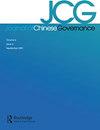Strategic ambiguity in policy formulation: exploring the function of the term “township and village enterprises” in china’s industrial ownership reforms
IF 3.7
3区 社会学
Q1 POLITICAL SCIENCE
引用次数: 2
Abstract
Abstract Ambiguity in policy formulation is a strategy setup with multifarious institutional flexibilities that maintain the credibility of functioning institutions. In the framework of the ‘credibility thesis’ as introduced by Peter Ho, this article posits that Chinese policymakers intentionally or unintentionally made a smart choice in coining the highly ambiguous term ‘TVEs’ for promoting institutional reforms on property rights, and providing a unique buffering effect for a (comparatively) smooth policy transition towards increasingly liberal reform agendas. Furthermore, TVEs’ content was evolving through time and consistently adapting to the interactions among various stakeholders in the reform process. The conceptual ‘3C’ model of strategic ambiguity in policy formulation elaborated by the evidence of TVEs might be an approach for China’s policy studies.政策制定中的战略模糊性:乡镇企业在中国工业所有制改革中的作用探析
摘要政策制定中的歧义是一种具有多种制度灵活性的战略设置,以保持运作机构的信誉。在何提出的“可信度理论”框架下,本文认为中国决策者有意或无意地做出了明智的选择,创造了高度模糊的术语“TVE”来促进产权制度改革,以及为(相对)平稳的政策过渡到日益自由的改革议程提供独特的缓冲作用。此外,TVE的内容随着时间的推移而不断发展,并不断适应改革进程中各利益攸关方之间的互动。TVE证据所阐述的政策制定中战略模糊的概念“3C”模型可能是中国政策研究的一种方法。
本文章由计算机程序翻译,如有差异,请以英文原文为准。
求助全文
约1分钟内获得全文
求助全文

 求助内容:
求助内容: 应助结果提醒方式:
应助结果提醒方式:


